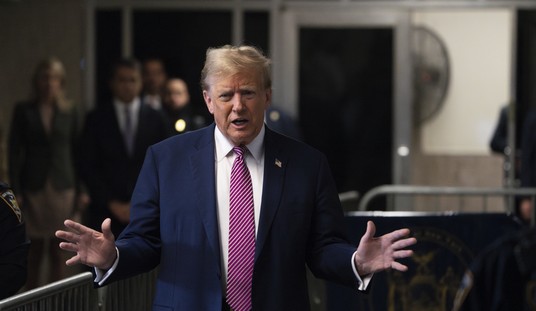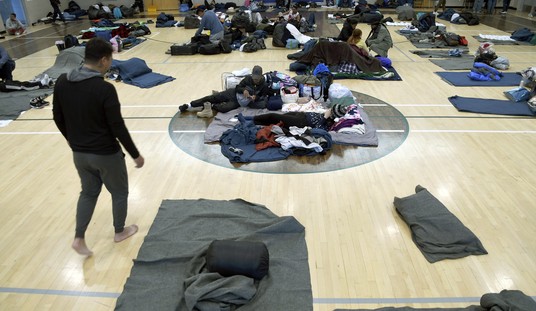Ed Morrissey had a very detailed rundown of the Supreme Court decision in Carpenter v US yesterday, providing details of both the majority decision and the multiple dissents filed by the court’s conservative justices. This won’t come as any sort of surprise to regular readers, but this decision once again left me shaking my head at the ongoing trend of the courts working to hamstring law enforcement efforts while protecting the “privacy” of suspects in increasingly imaginative reinterpretations of the constitution.
NBC News had some of the early reporting on the decision and it touches on what seems to be some of its major flaws.
The U.S. Supreme Court ruled Friday that obtaining “cell site location information” without a warrant was an invasion of privacy because that data can be used to monitor someone’s movements 24 hours a day, providing “near perfect surveillance” of a person’s travels — far beyond the narrow purpose of a criminal investigation.
The case concerned a Michigan man named Timothy Carpenter who was convicted in a string of robberies after FBI agents used location data from his cellphone to argue that he was near the crime scenes at the time the holdups happened. Its impact now extends to just about anyone who has a cellphone — more than 95 percent of American adults.
“Everyone should care about this,” said Andrew Crocker, a staff attorney for the Electronic Frontier Foundation, a nonprofit that advocates for digital privacy rights. “If the government doesn’t need warrants, then there’s nothing limiting them to collecting information from just the bad guys.”
The court’s majority appeared to be flipflopping back and forth between two constitutional questions here. The obvious one is the Fourth Amendment aspect, but they compounded the debate by arguing over what’s come to be known as “Freedom of Movement.” The latter is found in the Constitution’s Privileges and Immunities Clause, which states that citizens “shall be entitled to all Privileges and Immunities of Citizens in the several States.” The Supreme Court has long found that this meant that everyone has the right to free ingress into and egress from other states. As far as I know, there was no interstate movement recorded in the Carpenter case, but that’s really neither here or there.
At no point was the government (the police) hindering Carpenter’s movements. They were simply observing and recording them, albeit through electronic tracking. And where in the Freedom of Movement concept is it stated that you are not only free to move between the states as you choose but also free from having anyone (including the police) look at you while you are moving on the public thoroughfares? Once you leave the door of your castle and enter the public square, your expectation of privacy from having people look at you is essentially zero.
If you find the Fourth Amendment argument more compelling, you’re going to need to explain how it applies here. Suspects are assured that they shall be secure in their persons, houses, papers, and effects. In the internet age, your “papers” clearly include a lot more than physical letters found in your desk at home and I’m fine with that interpretation. But the records the police were collecting weren’t part of Carpenter’s “papers.” They were the property of the cellular service provider and nobody made him sign up for phone service with them.
Weakening their argument further is the remarkable claim that it would somehow be okay for the police to gather six days worth of cell tower data, but not seven. So your constitutional rights don’t kick in until a week goes by? Where does it say that in the constitution? Make up our minds for us already, guys.
As is freely admitted by everyone involved in the discussion, if the police have reason to suspect that you may be somehow involved with a crime they are investigating, they can legally follow you around and surveil you. They don’t need a warrant for that as long as they aren’t going onto private property. They can just have an unmarked car trail you around town. But at some point, the courts, for reasons which completely escape me, determined that they needed to do it in person. This ties back to the discussion about modern interpretations of the Fourth Amendment. As I said above, even if we are to accept (as I do) that your electronic communications are part of “your papers” and are protected, rather than limiting that to physical pieces of paper, why can’t law enforcement move past the horse and buggy days of tracking your movements via a tail and “observe” the suspect’s movements in the public square using these new “eyes” provided by technology?
The same information is being gathered. We’re talking about where the suspect traveled to at some point. If those movements prove relevant to the case the information should be available for use precisely the same as the testimony of the officer who tailed the suspect around in a car.
In the end, decisions such as the one in Carpenter serve only to further complicate the efforts of law enforcement to do their jobs. A stunning argument has been successfully made that in their efforts to solve a crime, the police should able to look at “some” data (such as six days worth of cell tower activity) but not “too much” data. That’s apparently one week’s worth in this case. It’s like having the constitution interpreted for you by the Mad Hatter at Alice’s tea party.
And what’s the privacy argument against having these cell tower records available to the police? NBC quoted the standard line, this time delivered by Andrew Crocker, a staff attorney for the Electronic Frontier Foundation “If the government doesn’t need warrants, then there’s nothing limiting them to collecting information from just the bad guys.”
Ah, yes. The eternal warnings about the boogieman known as Big Brother. We’ve been so conditioned to this line of thinking for generations now that people regularly mock the question, if you didn’t do anything wrong then why are you worried? But the question has been valid all along. Has it ever crossed your mind that if you’re not breaking any laws, the cops really don’t give a hoot how many times you went to Starbucks last week?
Now, if privacy advocates want to ask a serious, pertinent question raised by this case, I’ve got one for you. Why are cellular providers storing all of this location data to begin with? The cell towers really only need to complete the data transaction whenever a phone is within range and then forget about it. I’m far more worried about these companies storing all of this data and then either selling it off to advertisers or, far worse, failing to keep it secure and have it stolen by hackers looking to do us harm. And if they weren’t storing all of that data there would be nothing for the police to request so you’d be killing two birds with one stone. There’s a definite “Big Brother” aspect to this story, but it’s not Uncle Sam. It’s Verizon.







Join the conversation as a VIP Member